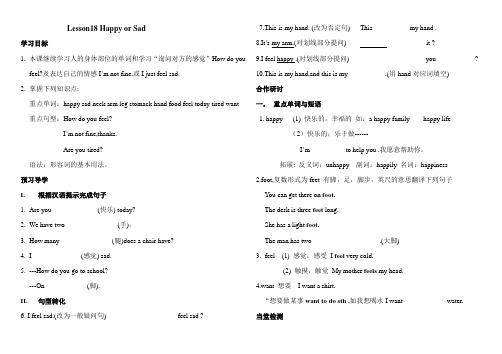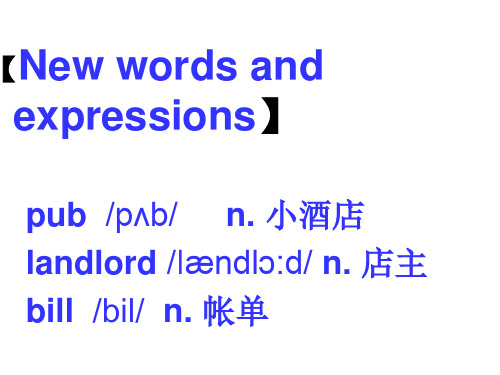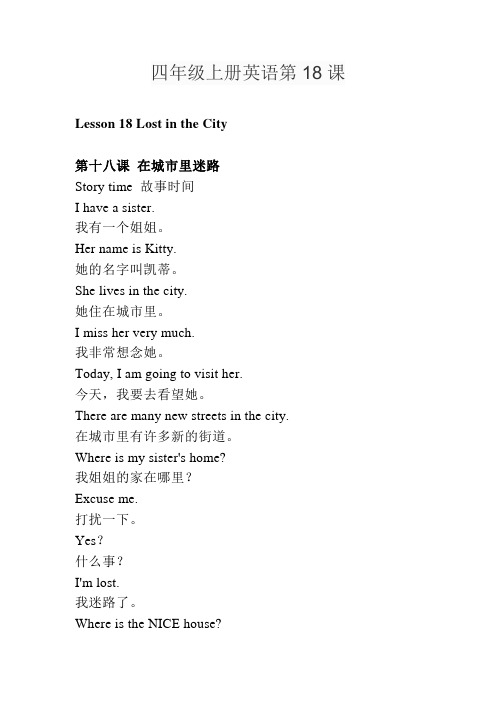Lesson 18
- 格式:doc
- 大小:24.00 KB
- 文档页数:3

Lesson18 Happy or Sad学习目标1.本课继续学习人的身体部位的单词和学习“询问对方的感觉”How do youfeel?及表达自己的情感I’m not fine.或I just feel sad.2.掌握下列知识点:重点单词:happy sad neck arm leg stomack hand food feel today tired want 重点句型:How do you feel?I’m not fine,thanks.Are you tired?语法:形容词的基本用法。
预习导学I.根据汉语提示完成句子1.Are you _____________(快乐) today?2.We have two _______________(手)。
3.How many _______________(腿)does a chair have?4.I ______________(感觉) sad.5.---How do you go to school?---On ____________(脚).II.句型转化6. I feel sad.(改为一般疑问句) ________ ________feel sad ?7.This is my hand. (改为否定句) This __________ my hand .8.It’s my arm.(对划线部分提问) ______ _________ it ?9.I feel happy .(对划线部分提问) ___________ _________you ___________?10.This is my hand,and this is my___________.(用hand对应词填空)合作研讨一,重点单词与短语1. happy (1) 快乐的,幸福的如:a happy family happy life(2)快乐的;乐于做------I’m __________to help you .我愿意帮助你。




四年级上册英语第18课Lesson 18 Lost in the City第十八课在城市里迷路Story time 故事时间I have a sister.我有一个姐姐。
Her name is Kitty.她的名字叫凯蒂。
She lives in the city.她住在城市里。
I miss her very much.我非常想念她。
Today, I am going to visit her.今天,我要去看望她。
There are many new streets in the city.在城市里有许多新的街道。
Where is my sister's home?我姐姐的家在哪里?Excuse me.打扰一下。
Yes?什么事?I'm lost.我迷路了。
Where is the NICE house?名叫NICE的房子在哪里?I meet a nice dog.我遇见了一只友善的狗。
The dog says, "Look! Go straight and turn left." 这只狗说,“看!直着走,向左转。
”But when I get there,但是当我到那里的时候,I see the Mice house,我看见的是名叫MICE的房子,not the NICE house.而不是叫NICE的房子。
Oh no!哦不!Excuse me, where is the NICE house?打扰一下,请问叫NICE的房子在哪里?I'll show you.我指给你。
Thank you.谢谢。
I meet an old bird.我遇见了一只年迈的鸟。
The old bird says,这只年迈的鸟说,"Go straight and turn right at the traffic lights. “直着走,在信号灯那里向右转。
Then you will see the Nice house on the left." 然后你就会在左边看见叫NICE的房子。

Lesson 18 Tian’anmen Square天安门广场◆课文英汉对照THINK ABOUT IT! 想一想!●Have you ever visited Tian’anmen Square? If yes, when? If no,why not?你曾经参观过天安门广场吗?如果去过,是在什么时候?如果没去过,为什么没去?●Do you want to visit Tian’anmen Square? Why or why not?你想去参观天安门广场吗?为什么想或者为什么不想?●What happens to Danny?丹尼发生了什么事?“Tian’anmen Square is big!”Says Li Ming. “It is Tuesday, but there are many people here!”“天安门广场很大!”李明说。
“今天是星期二,但是这儿有许多人!”“Yes!”says Jenny. “There are many children playing.”“是的!”詹尼说。
“有许多孩子在玩耍”“I see some men flying kites!” says Danny. “我看见一些人在放风筝!”丹尼说。
“Let’s fly a kite.”“我们放风筝吧。
”Can Jenny fly a kite? Yes! Jenny is having fun. 詹尼会放风筝吗?是的!詹尼玩的正高兴。
“This is easy!”says Jenny. Can Danny fly a kite?“这很简单!”詹尼说。
丹尼会放风筝吗?“Poor Danny! Are you okay?” asks Jenny.“可怜的丹尼!你还好吧?”詹尼问。
“No! I hurt my arm!” says Danny.“不好,我摔伤了胳膊!”丹尼说。
“Don’t worry.I can help you,”says Jenny. “Let’s put a bandage on your arm..”“不要担心,我能帮助你”詹尼说。
常干这这种事!Lesson 18 He often does this! 他经常干First listen and then answer the question.听录音,然后回答以下问题。
What had happened to the writer's bag?After I had had lunch at a village pub, I looked for my bag. I had left it on a chair beside the door and now it wasn't there! As I was looking for it, the landlord came in.‘Did you have a good meal?’he asked.‘Yes, thank you, ’I answered, ‘but I can't pay the bill . I haven't got my bag. ’The landlord smiled and immediately went out. In a few minutes he returned with my bag and gave it back to me.‘I'm very sorry, ’he said. ‘My dog had taken it into the garden. He often doesthis!’和短语语New words and expressions 生词和短pub(1. 1)/p)b/n. 小酒店bill(1. 5)/bil/n. 帐单landlord(1. 3)/'l$ndl&:d/n. 店主文注释释Notes on the text 课文注1 pay the bill, 付帐。
2 He often does this. 他经常干这种事。
Lesson 18
Porpoises
海豚
First listen and then answer the following question.
听录音,然后回答以下问题。
What would you say is the main characteristic of porpoises?
There has long been a superstition among mariners that porpoises will save drowning men by pushing them to the surface, or protect them from sharks by surrounding them in defensive formation. Marine Studio biologists have pointed out that, however intelligent they may be, it is probably a mistake to credit dolphins with any motive of lifesaving. On the occasions when they have pushed to shore an unconscious human being they have much more likely done it out of curiosity or for sport, as in riding the bow waves of a ship. In 1928 some porpoises were photographer working like beavers to push ashore a waterlogged mattress. If, as has been reported, they have protected humans from sharks, it may have been because curiosity attracted them and because the scent of a possible meal attracted the sharks. Porpoises and sharks are natural enemies. It is possible that upon such an occasion a battle ensued, with the sharks being driven away or killed.
Whether it be bird, fish or beast, the porpoise is intrigued with anything that is alive. They are constantly after the turtles, who peacefully submit to all sorts of indignities. One young calf especially enjoyed raising a turtle to the surface with his snout and then shoving him across the tank like an aquaplane. Almost any day a young porpoise may be seen trying to turn a 300-pound sea turtle over by sticking his snout under the edge of his shell and pushing up for dear life. This is not easy, and may require two porpoises working together. In another game, as the turtle swims across the oceanarium, the first porpoise swoops down from above and butts his shell with his belly. This knocks the turtle down several feet. He no sooner recovers his equilibrium than the next porpoise comes along and hits him another crack. Eventually the turtle has been butted all the way down to the floor of the tank. He is now satisfied merely to try to stand up, but as soon as he does so a porpoise knocks him flat. The turtle at last gives up by pulling his feet under his shell and the game is over.
RALPH NADING HILL Window in the Sea
New words and expressions 生词和短语
porpoise
n. 海豚
mariner
n. 水手
shark
n. 鲨鱼
formation
n. 队形
dolphin
n. 海豚科动物
unconscious
adj. 不省人事
beaver
n. 海狸
ashore
adv. 上岸
waterlogged
adj. 浸满水的
scent
n. 香味
ensue
v. 接着发生
intrigue
v. 引起兴趣
indignity
n. 侮辱
snout
n. 口鼻部
shove
v. 硬推
aquaplane
n. 驾浪滑水板
oceanarium
n. 水族馆
swoop
v. 猛扑
belly
n. 腹部
equilibrium
n. 平衡
butt
v. 碰撞
crack
n. 重击
参考译文
长期以来,海员中流传着一种迷信的说法,认为海豚会把快要淹死的人托到水面,救人性命;或在人们周围列队保护,使他们免遭鲨鱼伤害。
海洋摄影室的生物学家指出,无论海豚多么聪明,认为它们有救人的动机可能是错误的。
当它们偶尔把一个失去知觉的人推到岸边时,更大的可能是出于好奇或游戏,就像它们追逐被船首犁开的浪花一样。
1928年,有人拍摄到了海豚像海狸一样把浸透水的床垫推上岸的情景。
正如报道中所说,如果海豚保护人不受鲨鱼侵害,那么它们可能是出于好奇;而鲨鱼可能是闻到了可以美食一顿的香味。
海豚和鲨鱼是天然仇敌,双方可能随之发生搏斗,搏斗结果是海豚赶走或咬死鲨鱼。
海豚对凡是活的东西都感兴趣,不管是鸟、是鱼,还是野兽。
它们经常追逐海龟,海龟则温顺地忍受着各种侮辱。
一只小海豚特别喜欢用鼻子把海龟推到水面,然后像滑水板一样把海龟从水池的这一边推到那一边。
几乎每天都可以看到一只小海豚把鼻子顶入一只300磅重的海龟的硬壳下面,拼命地把它翻过来。
这并非易事,可能需要两只海豚合伙干才行。
在另一场游戏中,当海龟游过水族馆时,第一只海豚从上方猛扑下去,用腹部撞击龟壳。
这一下子把海龟撞下去好几英尺。
海龟刚恢复平衡,第二只海豚又冲过来猛击一下。
这只海龟最终被撞到池底。
此时的海龟,只要能站起来就满足了,但它刚站起来,就被一只海豚击倒。
海龟终于屈服了,将4条腿缩进壳内。
游戏到此结束。